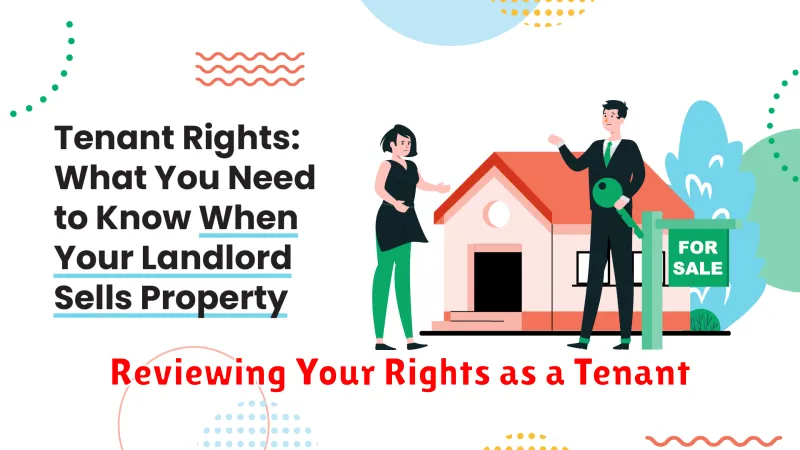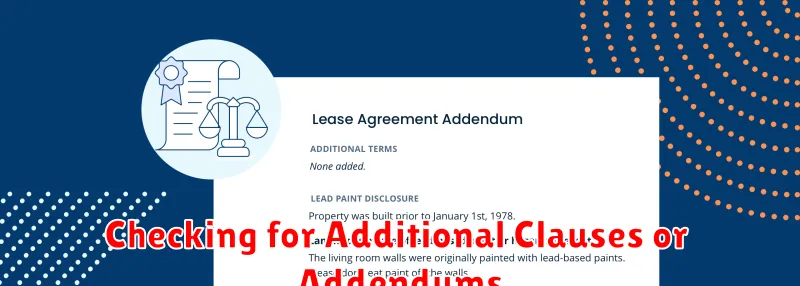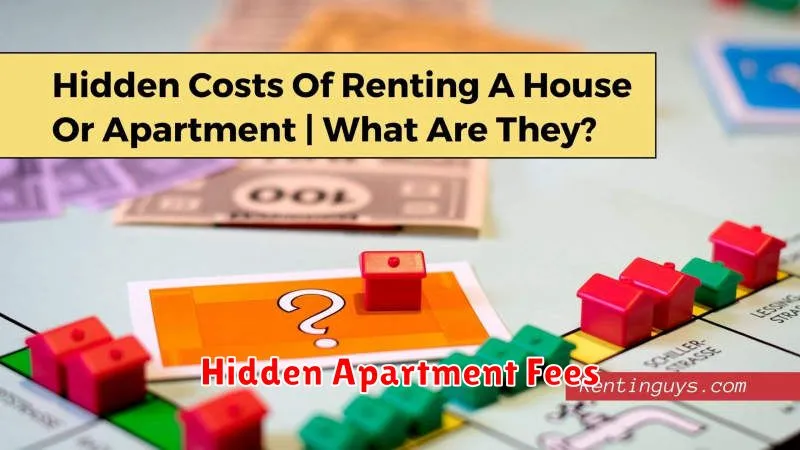Looking for a new place to live can be an exciting time, but navigating the world of apartment rentals can also be overwhelming. One of the biggest pitfalls renters face is hidden fees, which can significantly increase the overall cost of your rental. These sneaky fees can be tacked on at any point in the process, from application to move-in, and can add hundreds or even thousands of dollars to your budget. But don’t worry! By being aware of these potential costs and knowing how to avoid them, you can make sure your new apartment fits your budget and doesn’t leave you with any unpleasant surprises.
Common Hidden Fees in Apartment Rentals
Apartment hunting can be a stressful process, and it’s easy to get caught up in the excitement of finding the perfect place. However, it’s important to be aware of hidden fees that landlords may charge, which can significantly increase your overall rental cost.
Here are some of the most common hidden fees to watch out for:
- Application Fees: These fees are typically charged to cover the cost of processing your rental application, credit check, and background check. However, some landlords may charge excessive fees.
- Administrative Fees: These fees can cover a wide range of administrative tasks, such as lease signing, key replacement, or pet registration. Be sure to ask exactly what these fees cover.
- Pet Fees: Many landlords charge pet fees, which can include a non-refundable pet deposit, monthly pet rent, or both. Be sure to inquire about the specific pet policies and fees before you sign a lease.
- Parking Fees: If you need a parking space, be aware that some landlords may charge a monthly parking fee, even if the parking lot is unreserved.
- Amenity Fees: Some apartments offer amenities like a gym, swimming pool, or clubhouse. Landlords may charge a separate monthly fee for these amenities, in addition to the regular rent.
By being aware of these common hidden fees, you can avoid unpleasant surprises and ensure that you are making an informed decision about your rental costs.
Scrutinizing the Lease Agreement
Before signing on the dotted line, carefully scrutinize your lease agreement. This seemingly mundane document holds the key to unlocking potential hidden fees. Read every clause, especially the fine print. Pay close attention to sections on:
- Late fees: Understand the grace period and the penalty amount.
- Pet fees: If you have a pet, ensure you understand the deposit, monthly fees, and any breed restrictions.
- Utility costs: Determine if utilities are included in the rent or if you are responsible for paying them separately.
- Parking fees: If you require parking, check if there are any associated fees.
- Lease termination: Understand the conditions for breaking the lease and any applicable fees.
- Maintenance and repairs: Clarify the responsibilities for repairs and the process for reporting issues.
Don’t hesitate to ask the landlord for clarification on any unclear or questionable clauses. This is a crucial step to avoid surprise charges and protect yourself financially.
Inquiring About All Potential Costs Upfront
When searching for a new apartment, you may be tempted to focus on the monthly rent price. However, it’s important to understand that there can be various hidden fees that add up over time. One of the most effective ways to avoid unexpected expenses is by inquiring about all potential costs upfront.
Ask the landlord or property manager for a detailed breakdown of all fees, including but not limited to:
- Security deposit
- Application fee
- Pet deposit or monthly pet rent
- Parking fees
- Utilities (water, gas, electricity, trash)
- Move-in/move-out fees
- Late payment fees
- Early lease termination fees
Don’t hesitate to ask for clarification on any charges that seem unclear or unreasonable. A comprehensive understanding of all potential costs will help you budget effectively and avoid surprises down the road. Remember, transparency from the landlord is crucial for a smooth and financially sound renting experience.
Understanding Utility Charges and Responsibilities
When renting an apartment, it’s crucial to understand the utility charges and responsibilities involved. This can help you avoid unexpected costs and ensure a smooth rental experience.
Some landlords include utilities in the monthly rent, while others require tenants to pay for them separately. It’s essential to clarify this upfront. Ask specific questions about which utilities are included, such as electricity, gas, water, sewage, trash removal, and internet. If they aren’t included, find out how they are billed (e.g., individually or through a master account).
If you’re responsible for paying your own utilities, inquire about the estimated monthly cost and any associated fees or deposits. Additionally, check whether there are any restrictions or limitations on your usage. For instance, some landlords might impose limits on water consumption.
Understanding utility charges and responsibilities is crucial for managing your budget and avoiding hidden fees. By being clear with your landlord from the beginning, you can ensure a transparent and stress-free rental experience.
Negotiating Move-In and Move-Out Fees
While you may not be able to completely avoid all fees when renting an apartment, understanding your rights and negotiating with your landlord can help you minimize unnecessary expenses. When it comes to move-in and move-out fees, there are a few common areas where you can potentially save some money.
Move-In Fees:
- Security Deposit: This deposit, typically equal to one or two months’ rent, is intended to cover damages to the apartment. While some landlords require an additional pet deposit, you can try to negotiate a lower amount or include it within the overall security deposit.
- Application Fee: This fee is typically charged to cover the costs of processing your application. Some landlords are willing to waive the application fee, especially if you’re a highly qualified applicant.
- Cleaning Fee: A cleaning fee is intended to ensure the unit is left clean and ready for the next tenant. However, it is often a separate fee that many landlords would be happy to waive if you agree to clean the unit yourself.
- Admin Fee: This fee is often a flat fee charged to cover administrative costs. You may be able to negotiate a lower fee, especially if you’re renting long-term.
Move-Out Fees:
- Cleaning Fee: While many leases include a clause that allows the landlord to charge a cleaning fee, you can potentially avoid this by ensuring the unit is clean and properly maintained when you move out.
- Late Fees: Pay your rent on time to avoid late fees. You can often negotiate with the landlord to reduce or waive late fees if you have a valid reason for being late.
- Pet Damage: If you have a pet, you may be required to pay a pet deposit or additional fees for damage to the unit. To minimize these costs, you should ensure your pet is properly trained and well-behaved, and take steps to prevent damage to the apartment.
- Early Termination Fee: If you need to break your lease early, there may be a fee involved. However, you may be able to negotiate a lower fee or find a subletter to take over your lease.
Negotiating Tactics:
- Be prepared: Before starting any negotiations, carefully read your lease agreement and understand the specific fees involved.
- Be polite and respectful: While it’s important to advocate for yourself, it’s also important to be respectful of your landlord’s time and position.
- Offer a counterproposal: If you’re not happy with the landlord’s initial offer, be prepared to offer a counterproposal.
- Be willing to walk away: If you feel like you’re not getting a fair deal, you may be able to find another apartment where you can avoid these fees.
Remember that negotiation is a two-way street. By being informed, prepared, and respectful, you can increase your chances of successfully negotiating move-in and move-out fees and saving money on your apartment rental.
Researching Average Costs in Your Area
Before you start looking at apartments, it’s essential to research the average costs in your area. This will give you a good baseline for what to expect and help you avoid being surprised by inflated prices. You can use online resources such as Zillow, Trulia, or Rent.com to get an idea of the average rent for different types of apartments in your area. You can also ask local real estate agents for their insights.
When researching, consider factors such as:
- Location: Apartments in desirable neighborhoods tend to be more expensive than those in less popular areas.
- Size: Larger apartments generally cost more than smaller ones.
- Amenities: Features such as a swimming pool, gym, or parking can add to the monthly rent.
- Property type: Apartments in newer buildings may have higher rents than older ones.
By researching the average costs in your area, you’ll be better equipped to negotiate rent and avoid hidden fees. You’ll also have a clear understanding of the market and be able to identify any potential red flags.
Documenting All Communication and Agreements
When it comes to renting an apartment, it’s crucial to have a clear understanding of all fees and costs involved. A common way landlords can take advantage of tenants is through hidden fees. These fees can be disguised in various ways, such as additional charges for utilities, pet deposits, or even cleaning fees. To avoid falling prey to such practices, meticulously document all communication and agreements with your landlord.
Make sure to keep copies of all emails, text messages, phone call notes, and signed documents related to your tenancy. This documentation can be crucial evidence in case any disputes arise regarding hidden fees. When discussing fees, always ask for a detailed breakdown in writing and ensure all agreements are clearly outlined in your lease agreement.
If a landlord attempts to impose any unexpected fees, refer to your documented communication and agreements. If you can demonstrate that the fee is not outlined in your lease or any previous communication, you have a stronger argument for refusing to pay. Remember, it’s essential to be proactive and protect yourself from hidden fees by documenting everything related to your rental agreement.
Reviewing Your Rights as a Tenant

Understanding your rights as a tenant is crucial in avoiding hidden fees. Your lease agreement should clearly outline all costs, including rent, utilities, and any additional charges. Always read the entire lease carefully before signing, and don’t hesitate to ask questions about any terms or fees that seem unclear.
State and local laws protect tenants from unfair or illegal fees. Familiarize yourself with these laws by contacting your local tenant’s rights organization or reviewing online resources. For example, some states regulate the amount of security deposits landlords can collect, while others prohibit certain types of fees altogether.
Be aware of common hidden fees such as application fees, pet fees, late fees, and move-in/move-out charges. Inquire about these fees upfront and ensure they are clearly outlined in your lease agreement. If you encounter any fees that seem excessive or unjustified, don’t be afraid to challenge them, relying on your knowledge of tenant rights and local regulations.
Checking for Additional Clauses or Addendums

Don’t just skim the lease agreement. You should carefully examine all additional clauses or addendums, which are separate documents that may contain important details regarding additional fees or responsibilities. These documents can cover various topics like pet fees, parking fees, utility responsibilities, and more. Failure to read and understand these clauses can result in unexpected fees and disputes later on.
For example, the addendum may mention a specific type of insurance required by the landlord for your unit. You may also find clauses concerning late rent fees, cleaning fees, or even fees for unauthorized guests. Pay close attention to the wording and ensure you understand the implications of each clause.
Don’t hesitate to ask the landlord for clarification on any confusing or unclear sections. It’s better to be safe than sorry, and a little extra time spent understanding these documents can save you a lot of stress and money in the long run.
Seeking Professional Advice if Needed

While doing your own research is great, sometimes you might need a professional eye to help you navigate the complex world of apartment rentals. If you’re unsure about any clauses in the lease, or if you’re concerned about potential hidden fees, consider consulting a real estate lawyer or a tenant advocacy group.
They can help you understand your rights and obligations as a tenant, and they can also advise you on how to negotiate with landlords and avoid hidden costs. Don’t be afraid to seek professional help when you need it – it can save you a lot of money and stress in the long run.
Being Prepared for Unexpected Expenses
While you’re busy planning for your move and exploring your new apartment, it’s important to remember that unexpected expenses can pop up at any time. These costs can range from minor repairs to major appliance malfunctions, potentially straining your budget.
To avoid being caught off guard, consider building a contingency fund specifically for these unexpected expenses. Aim for a cushion of 1-2 months’ rent, which can help cover the cost of repairs, replacements, or even an unexpected move. This financial buffer will provide peace of mind and ensure you’re ready to handle whatever comes your way.
Furthermore, ensure you have renters insurance to protect your belongings and yourself from unforeseen events like theft or damage. While it may seem like an additional cost, it can save you from significant financial burden in the long run.
By being proactive and financially prepared for unexpected expenses, you can navigate the world of apartment living with confidence. Remember, a little planning goes a long way in protecting your budget and ensuring a smooth transition into your new home.

